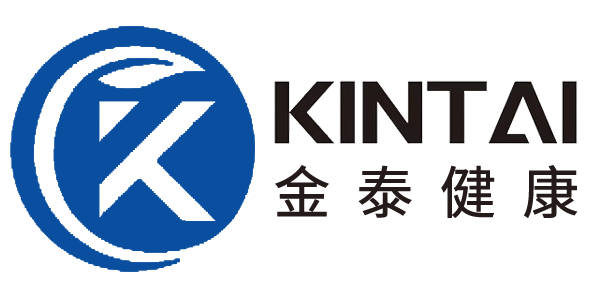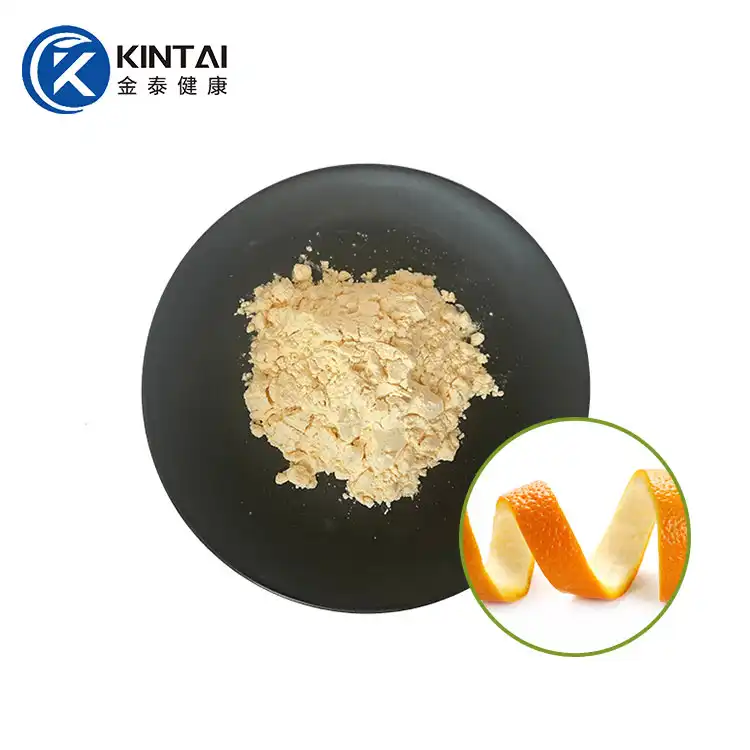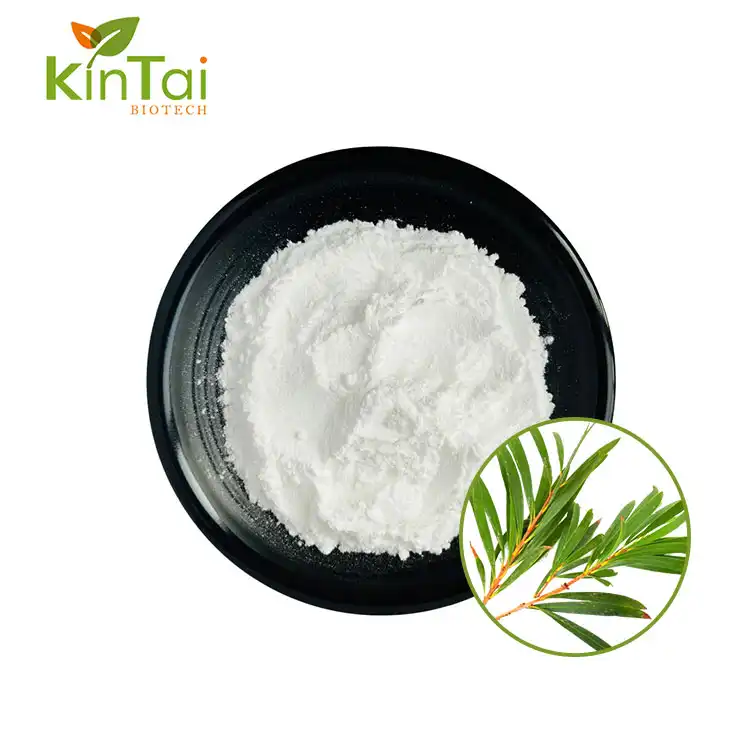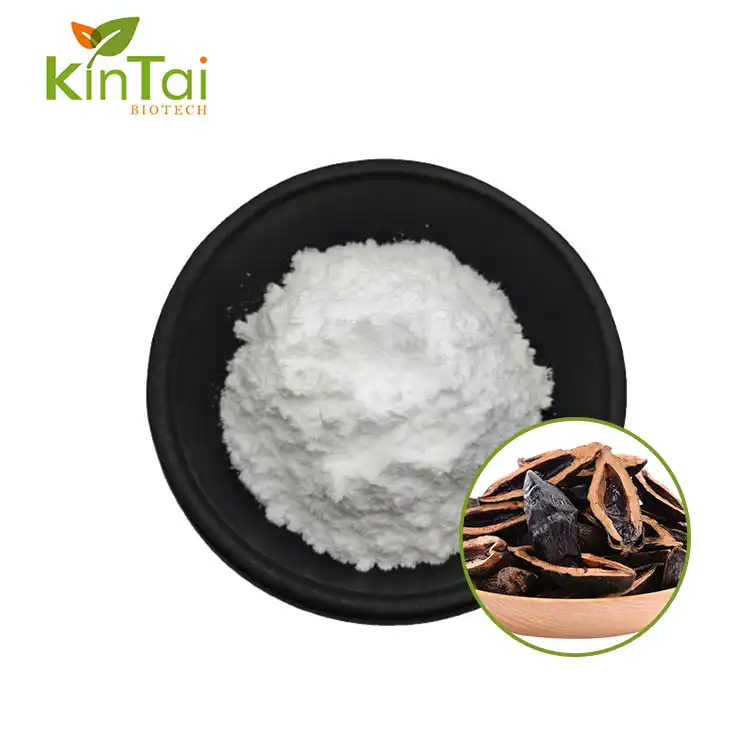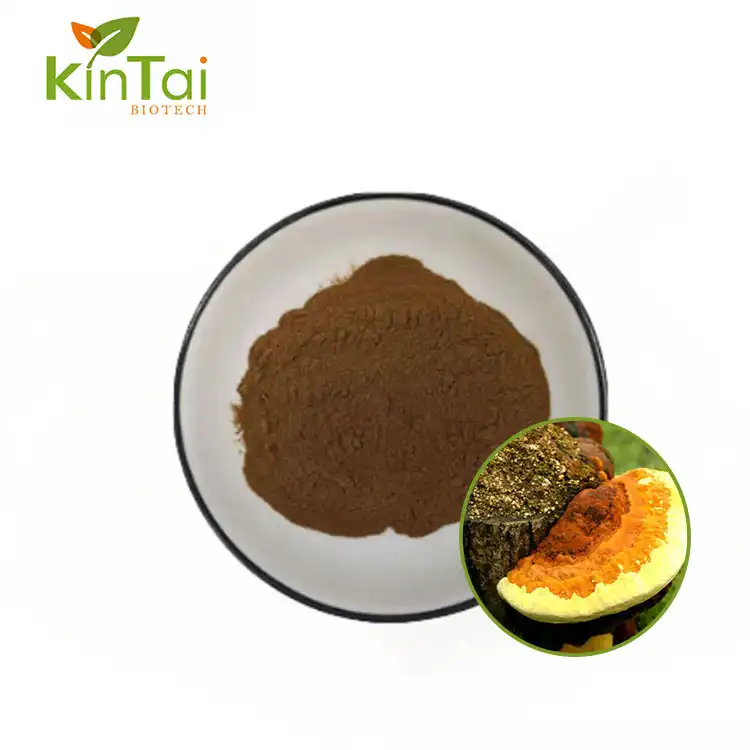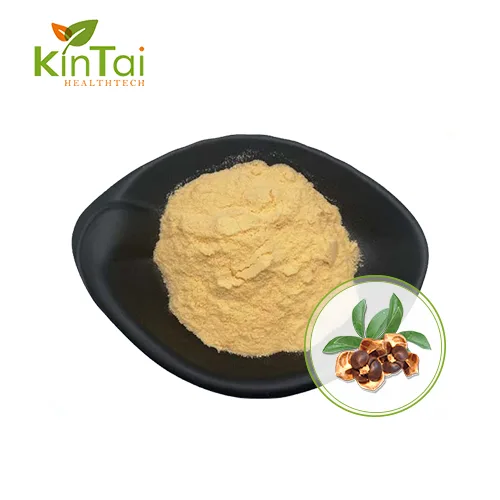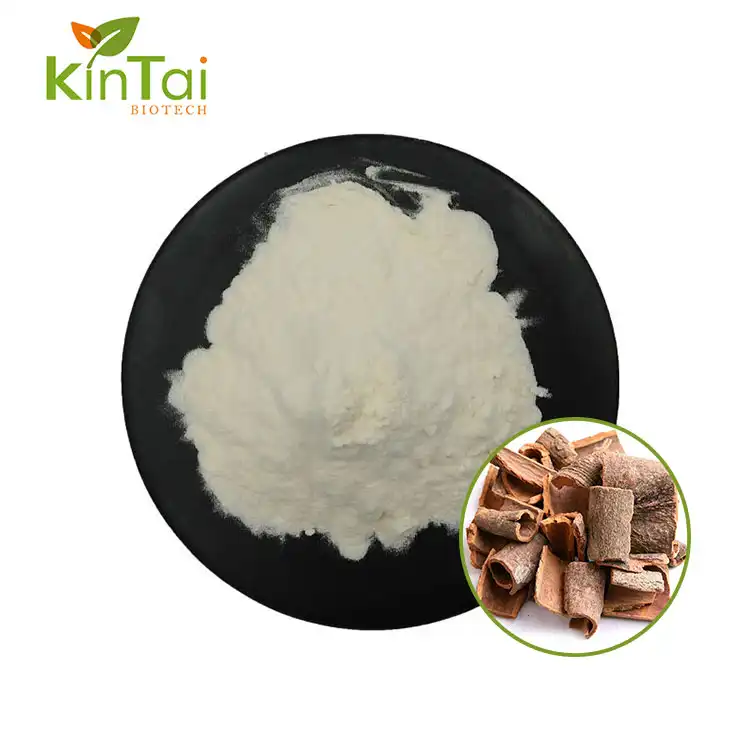Is Corosolic Acid Powder Suitable For Diabetics?
2024-11-05 09:51:15
Corosolic acid powder has gained attention in recent years for its potential benefits in managing blood sugar levels, making it a topic of interest for diabetics. Derived from the leaves of the banaba tree (Lagerstroemia speciosa), corosolic acid is a natural compound that has shown promising results in various studies. This blog post will explore the suitability of corosolic acid powder for diabetics, its potential benefits, and important considerations for its use.

How does corosolic acid affect blood sugar levels?
Corosolic acid has been found to have a significant impact on blood sugar levels, making it a compound of interest for those managing diabetes. The primary mechanism by which corosolic acid affects blood glucose is through its ability to enhance insulin sensitivity and glucose uptake in cells.
Research has shown that corosolic acid can activate glucose transporter 4 (GLUT4), a protein responsible for facilitating glucose uptake into cells. By increasing GLUT4 translocation to the cell membrane, corosolic acid helps improve the efficiency of glucose transport from the bloodstream into cells, particularly in muscle and fat tissues. This enhanced glucose uptake can lead to lower blood sugar levels and improved insulin sensitivity.
Furthermore, corosolic acid has been found to inhibit certain enzymes involved in carbohydrate metabolism, such as α-glucosidase and α-amylase. These enzymes are responsible for breaking down complex carbohydrates into simple sugars. By inhibiting their activity, corosolic acid can help slow down the digestion and absorption of carbohydrates, resulting in a more gradual rise in blood sugar levels after meals.
Several studies have demonstrated the blood sugar-lowering effects of corosolic acid. In a randomized, double-blind, placebo-controlled study published in the Journal of Ethnopharmacology, participants with type 2 diabetes who took corosolic acid extract for two weeks showed significant reductions in fasting and postprandial blood glucose levels compared to the placebo group.
Another study published in the journal Diabetes Research and Clinical Practice found that corosolic acid powder supplementation improved insulin sensitivity and glucose tolerance in subjects with impaired glucose tolerance or mild type 2 diabetes. The researchers observed a decrease in fasting blood glucose levels and improved insulin response after a glucose challenge.

It's important to note that while these results are promising, more extensive clinical trials are needed to fully establish the long-term efficacy and safety of corosolic acid for managing blood sugar levels in diabetics. Individuals with diabetes should always consult with their healthcare provider before incorporating corosolic acid or any new supplement into their treatment regimen.
What are the recommended dosages of corosolic acid for diabetics?
Determining the appropriate dosage of corosolic acid for diabetics is crucial for maximizing its potential benefits while minimizing any potential risks. However, it's important to note that there is no universally agreed-upon standard dosage, as research is still ongoing, and individual responses may vary.
Most studies investigating the effects of corosolic acid on blood sugar control have used dosages ranging from 32 to 48 mg per day. Some researchers have found that even lower doses, around 10 mg per day, may be effective in improving glucose metabolism. It's worth noting that these dosages typically refer to the standardized extract of corosolic acid, not the raw powder form.
When considering corosolic acid supplementation, it's crucial to start with a lower dose and gradually increase it under the guidance of a healthcare professional. This approach allows for monitoring of individual responses and helps minimize the risk of potential side effects.
Factors that may influence the appropriate dosage include:
-
The severity of diabetes or insulin resistance
-
Body weight and metabolism
-
Concurrent medications or supplements
-
Overall health status
-
Individual sensitivity to the compound
It's important to emphasize that corosolic acid should not be considered a replacement for prescribed diabetes medications. Instead, it should be viewed as a potential complementary approach to be used in conjunction with conventional treatments and lifestyle modifications.

When using corosolic acid powder, it's essential to consider the concentration of the active compound. Some products may contain standardized extracts with a specific percentage of corosolic acid, while others may be less concentrated. Always check the product label and consult with a healthcare provider to determine the appropriate amount based on the specific formulation.
Timing of supplementation may also play a role in its effectiveness. Some studies suggest taking corosolic acid before meals, particularly before carbohydrate-rich foods, to help manage postprandial blood sugar spikes. However, the optimal timing may vary depending on individual circumstances and should be discussed with a healthcare professional.
It's crucial for diabetics to closely monitor their blood glucose levels when incorporating corosolic acid or any new supplement into their regimen. This monitoring allows for adjustments to be made if necessary and helps prevent potential hypoglycemic episodes.
As with any supplement, consistency is key. The effects of corosolic acid on blood sugar control may take time to become noticeable, and regular use as directed by a healthcare provider is typically necessary to achieve optimal results.
Can corosolic acid interact with diabetes medications?
When considering the use of corosolic acid powder for diabetics, it's crucial to understand its potential interactions with diabetes medications. As corosolic acid has been shown to have blood sugar-lowering effects, there is a possibility of interactions with various antidiabetic drugs, which could potentially lead to hypoglycemia or other complications if not properly managed.
Insulin: Corosolic acid may enhance the effects of insulin, potentially leading to a more significant reduction in blood glucose levels. This interaction could increase the risk of hypoglycemia, especially in individuals who are already on insulin therapy. Close monitoring of blood sugar levels and potential adjustments to insulin dosages may be necessary when using corosolic acid concurrently.
Sulfonylureas: Medications in this class, such as glipizide and glyburide, work by stimulating insulin production in the pancreas. When combined with corosolic acid, there may be an additive effect on lowering blood sugar levels. This could potentially increase the risk of hypoglycemia, particularly in sensitive individuals or those on higher doses of sulfonylureas.
Metformin: While metformin primarily works by reducing glucose production in the liver and improving insulin sensitivity, its effects may be enhanced when used alongside corosolic acid. This combination could potentially lead to a more significant reduction in blood glucose levels, necessitating careful monitoring and possible dosage adjustments.
DPP-4 inhibitors and GLP-1 receptor agonists: These newer classes of diabetes medications work by increasing insulin production and decreasing glucagon secretion. The addition of corosolic acid to these treatments may result in a more pronounced blood sugar-lowering effect, which could require dose adjustments or closer monitoring.
SGLT2 inhibitors: These medications work by increasing glucose excretion through the urine. While the mechanism of action differs from corosolic acid, the combined effect on blood glucose levels should be considered and monitored.
It's important to note that these potential interactions are based on the known mechanisms of action and limited available research. The exact nature and extent of interactions between corosolic acid and diabetes medications may vary depending on individual factors, dosages, and specific drug formulations.

To minimize the risk of adverse interactions, diabetics considering corosolic acid supplementation should:
-
Consult with their healthcare provider: Before starting any new supplement, including corosolic acid, it's essential to discuss it with a doctor or diabetes specialist. They can provide personalized advice based on individual health status, current medications, and treatment goals.
-
Monitor blood glucose levels closely: Regular blood sugar monitoring is crucial when introducing corosolic acid, especially in the initial weeks of use. This allows for early detection of any significant changes in glucose levels that may require medication adjustments.
-
Start with a low dose: Beginning with a lower dose of corosolic acid and gradually increasing it under medical supervision can help minimize the risk of sudden blood sugar fluctuations and allow for better assessment of its effects in combination with existing medications.
-
Be aware of hypoglycemia symptoms: Diabetics should be familiar with the signs of low blood sugar, such as dizziness, sweating, confusion, and weakness. If these symptoms occur, they should check their blood glucose levels and take appropriate action as advised by their healthcare provider.
-
Maintain open communication: Regular follow-ups with healthcare providers are essential when using corosolic acid alongside diabetes medications. This allows for ongoing assessment of its effectiveness and safety, as well as timely adjustments to the overall treatment plan if needed.
-
Consider potential effects on other medications: Corosolic acid may interact with other medications beyond those used for diabetes management. A comprehensive medication review with a healthcare provider or pharmacist can help identify any potential concerns.
In conclusion, while Corosolic acid powder shows promise as a natural supplement for blood sugar management, its use in conjunction with diabetes medications requires careful consideration and professional guidance. The potential for interactions underscores the importance of individualized treatment plans and close monitoring when incorporating corosolic acid into a diabetes management regimen. As research in this area continues to evolve, staying informed and maintaining open communication with healthcare providers remains crucial for optimizing diabetes care and minimizing risks associated with supplement use.
Kintai Healthtech Inc. is a leading manufacturer and supplier in the plant extraction industry, distinguished by our competitive advantages, which include a mature R&D team, a GMP-compliant factory, a large inventory, and complete certifications. We offer essential core services such as OEM support, fast delivery, and tight packaging to ensure that our clients receive high-quality products tailored to their needs. Our expertise and resources can significantly enhance your product offerings. For more details, please consult us at info@kintaibio.com. We look forward to the opportunity to work with you!
References
- Judy, W. V., et al. (2003). Antidiabetic activity of a standardized extract (Glucosol™) from Lagerstroemia speciosa leaves in Type II diabetics: A dose-dependence study. Journal of Ethnopharmacology, 87(1), 115-117.
- Miura, T., et al. (2006). Antidiabetic effects of corosolic acid in KK-Ay diabetic mice. Biological and Pharmaceutical Bulletin, 29(3), 585-587.
- Fukushima, M., et al. (2006). Effect of corosolic acid on postchallenge plasma glucose levels. Diabetes Research and Clinical Practice, 73(2), 174-177.
- Stohs, S. J., et al. (2012). A review of the efficacy and safety of banaba (Lagerstroemia speciosa L.) and corosolic acid. Phytotherapy Research, 26(3), 317-324.
- Takagi, S., et al. (2010). Effect of corosolic acid on the hydrolysis of disaccharides. Journal of Nutritional Science and Vitaminology, 56(4), 266-269.
- Kajimoto, O., et al. (2000). Effect of a supplement containing banaba extract on glucose metabolism in healthy subjects. Journal of Health Science, 46(2), 84-90.
- Klein, G., et al. (2007). Antidiabetes and Anti-obesity Activity of Lagerstroemia speciosa. Evidence-Based Complementary and Alternative Medicine, 4(4), 401-407.
- Hou, W., et al. (2009). The hypoglycemic activity of Lagerstroemia speciosa L. extracts in HIT-T15 cells and diabetic rats. Journal of Pharmacy and Pharmacology, 61(7), 869-875.
- Liu, F., et al. (2001). An extract of Lagerstroemia speciosa L. has insulin-like glucose uptake-stimulatory and adipocyte differentiation-inhibitory activities in 3T3-L1 cells. Journal of Nutrition, 131(9), 2242-2247.
- Yamada, K., et al. (2008). Effect of corosolic acid on gluconeogenesis in rat liver. Diabetes Research and Clinical Practice, 80(1), 48-55.
